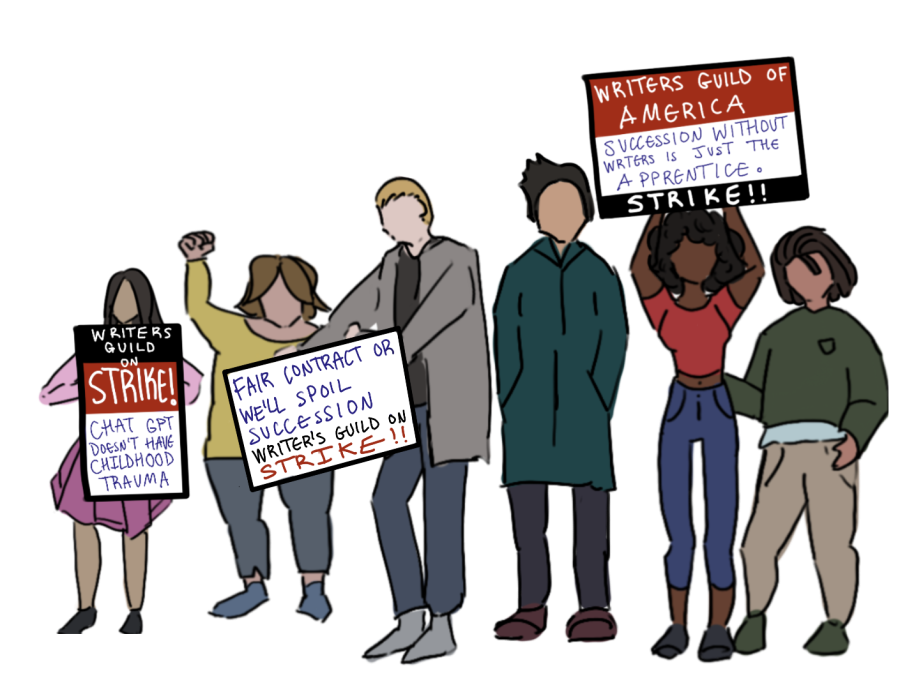Advocating for writers’ rights
Workers are seen on strike, asking for better pay and protesting about artificial intelligence and succession.
May 24, 2023
Some of the best moments I’ve spent with my parents have been sitting down at night to watch TV — whether it’s “Saturday Night Live” (SNL), “Young Sheldon” or yet another “Modern Family” rewatch, being able to take a break from a busy day and laugh with my family is something that I’ve come to greatly appreciate. Behind all the funny skits and scenes we watch are a group of individuals who are not adequately valued despite being absolutely crucial to the entertainment industry: writers.
Starting on May 2, the Writers Guild of America (WGA) went on strike across Hollywood and New York City for the first time since 2007. The WGA is fighting for many different demands, some of the most notable being residual payments, which would give writers a percentage of the profit made from any time a show is aired, along with streaming transparency, which would allow writers to know the successes and failures of shows on streaming platforms.
With the rise of streaming, making a living as a writer has become increasingly difficult. Instead of having consistent, reliable jobs on 22-episode broadcast shows , many writers now work for shorter shows on streaming platforms , which can span for as little as eight episodes . This leaves writers in a constant scramble to find new jobs, as opposed to before streaming, when writers could commit themselves to one show for years. The additional problem with streaming is that writers cannot see their ratings, so if a show succeeds, writers are at risk of being underpaid. If writers aren’t kept in the dark about their viewership, they will be more able to advocate for the pay they deserve.
As streaming has developed, advertisements have been used in platforms such as Hulu, Disney+ and HBO Max. The cost of advertisements on streaming services is dependent on how many viewers a given show has — companies are giving this information to third-party companies, meaning that viewership and ratings are accessible. However, writers aren’t given access to these ratings despite being affected by them.
Historically, the television industry pays writers based on the success of a show — being a freelance profession, writing is, and always has been, a success-driven business, meaning that however much money a show makes will impact how much a writer is given. Even though streaming has vastly changed the industry, companies should ensure that writers are paid fairly and truthfully instead of being robbed of their successes.
Earning salaries based on the successes of shows on streaming would benefit all writers, but especially those who are just breaking out in the industry and middle-class writers. Having a hit show would allow writers to have financial stability while looking for their next job — this would give new writers opportunities to discover what they want to write, since they will eventually become show-runners themselves.
With writers on strike, American TV and film production has been interrupted the most since the shutdowns due to the COVID-19 pandemic in 2020. Many late-night TV shows have stopped releasing new episodes altogether. Many series, such as “Stranger Things ,” “Abbott Elementary” and “Yellowjackets ,” are expected to run out of episodes in the coming weeks, according to the Los Angeles Times. Each day without writers, California’s economy is expected to lose approximately 30 million dollars, according to the WGA.
Writers have proved their value to the industry and the economy by going on strike — without them, movies and TV are nearly at a standstill, and California is losing money every single day. Studios should not be ignoring their demands or trying to find ways around them, such as the use of artificial intelligence to write scripts — instead, they should be trying to compromise. Writers should be acknowledged for their importance in the industry, and while not all of their demands can easily be granted, they should not be immediately dismissed.
Many of the writers’ demands will require structural changes for studios to put them in place. However, the industry has constantly evolved; examples of this are streaming, the decrease in pilot episodes and, more recently, artificial intelligence. But just because the writers’ demands would require extensive change doesn’t mean we should be opposed to it. In an industry that is constantly developing, companies should be developing alongside it by transforming the system of how writers are treated.
Additionally, if we don’t grant writers the right to steadier work and residual payments, we fail to assign value to creativity and send the message that expression and artistry are not as important compared to other jobs in society. The dream of being a writer while also maintaining a steady lifestyle should be attainable for more than just a select few. Because of our environment, it is easy to make the mistake of taking media and content for granted — however, creativity should not be undermined in this way. Creative jobs are just as important as any other, and we owe them the respect they deserve.












































